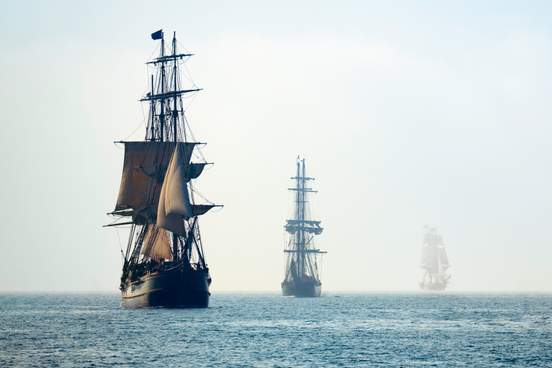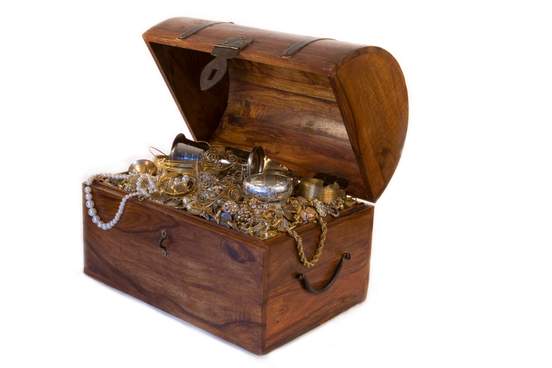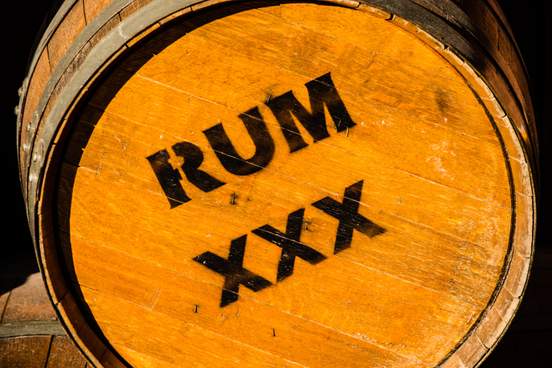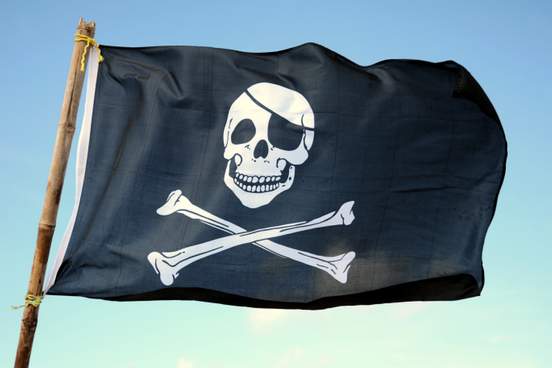
Introduction
Ahoy corsairs, buccaneers, and those who love the scurvy dogs! It’s time to set sail on a lexicographical journey—which we all agree is the best kind of journey, whether on International Talk Like a Pirate Day or any day. While pirate-speak as we tend to think of it is more a product of Hollywood than of historicity, no one’s going to send you to Davy Jones’s locker if you drop one or more of these pirate-related words around the water cooler. So ladle yourself some grog, shake your booty, and hoist the Jolly Roger—it’s time to freeboot like it’s 1699.

Swashbuckler
What is swash and why buckle it? Questions every aspiring pirate must ask themselves on their own personal walk down the plank of life, to be sure. In truth, swashbuckler, which refers to “a swaggering or daring soldier or adventurer,” did not come about as a way of describing a person who buckles swash, or otherwise disturbs the water between a sandbank and the shore. Swashbuckler instead comes from combining a sense of the verb swash (“to act in a blustering and bullying manner”) with the noun buckler (“a small round shield held by a handle at arm’s length”).
There was no reply from the bruised and battered regiment, save that one man made broadcast challenges to fist fights and the red-bearded officer walked rather near and glared in great swashbuckler style at a tall captain in the other regiment. But the lieutenant suppressed the man who wished to fist fight, and the tall captain, flushing at the little fanfare of the red-bearded one, was obliged to look intently at some trees.
— Stephen Crane, The Red Badge of Courage (D. Appleton and Company, 1895)

Ahoy
Had Alexander Graham Bell had his way, we’d all be saying “ahoy” rather than “hello” when answering the phone, whether receiving a call from our matey or from the dentist’s office. Ahoy has been in use at least since the mid-18th century to call out, especially to a passing ship or boat. It tacks an a (as in aha) onto hoy, an older interjection used to draw attention to something or in driving animals. This hoy is thought to have arisen as a natural exclamation, but a second hoy, referring to “a small usually sloop-rigged coasting ship,” entered Middle English in the 1400s from the Middle Dutch hoei. But while you might assume ahoy to mean “A ship!,” it really means “Hey ship!”
The captain of the Vengeance, upon going forward to see what the strange thing might be, was greatly astonished at being hailed as follows: “Ship ahoy. For the love of Heaven stop and take on board two helpless women, who have but just escaped from the pirates.”
— Benjamin Barker, Blackbeard; or, The Pirate of the Roanoke. A Tale of the Atlantic. (F. Gleason, 1847)

Avast
If you’re a pirate captain and need one or more landlubbers to stop doing something posthaste, you have no better friend than the word avast, a nautical command to stop or cease. Avast is thought to come from perhaps from the Dutch houd vast, meaning “hold fast,” and is one of only a handful of what are called “imperative verbs” in English—that is, verbs that are always used in the form of a command. Others include the familiar giddyap and now-archaic aroint.
Upon entering the place I found a number of young seamen gathered about a table, examining by a dim light divers specimens of skrimshander. I sought the landlord, and telling him I desired to be accommodated with a room, received for answer that his house was full—not a bed unoccupied. “But avast,” he added, tapping his forehead, “you haint no objections to sharing a harpooneer’s blanket, have ye? I s’pose you are goin’ a-whalin’, so you’d better get used to that sort of thing.”
— Herman Melville, Moby-Dick; or, The Whale (Harper & Brothers, 1851)

Booty
Occasionally, words with distinctive meanings may share a spelling and a pronunciation but have different origins, making them entirely different words. Such is the case with booty. The sense meaning “plunder,” favorite of many a piratical old salt, has been in our language since the 15th century and can be traced to the Middle Low German word būte, meaning “distribution, share, plunder.” The slang word booty meaning “buttocks,” though spelled and pronounced the same, has a distinctive origin and is therefore an entirely different word. Dating from the early 20th century, it comes (via African American English and possibly an English-based creole) from the Early Modern English word bottie, meaning “buttocks.” Accordingly, and as you might guess, bootylicious does not describe a galleon laden with doubloons, at least not literally.
“What ho! messmates!” I cried. “Fortune has been kind to our bold band this day. We have taken large booty. Let us up anchor and set sail. Before yon sun has sunk into the deep we shall be far away, and our swift craft is able to shake off all pursuit.”
— Emerson Hough, The Lady and the Pirate (The Bobbs-Merrill Company, 1913)

Scurvy
Scurvy is one of the oldest-known nutritional disorders known to humankind. Now known to be caused by a lack of vitamin C, a nutrient found in many fresh vegetables and fruits (such as citrus), it has historically led to disability and mortality among sailors on long sea voyages where such foods were scarce. Both noun and adjective forms of scurvy developed from scurf, a word referring to flakes of dead skin that dates back to Old English. The adjective scurvy originally meant “covered or affected with scurf” in the early 16th century but within a few decades began to be used to mean “contemptible” or “despicable.”
“I spend half my time chasing those scurvy boys,” said Father, slurping a bowl of Mother’s rich cockle soup. Jack had provided the cockles from sea cliffs near the Bard’s house. “They slide away like eels when there’s real work to be done.”
— Nancy Farmer, The Sea of Trolls (Atheneum, 2004)

Grog
Grog is often depicted as a potent potable popularly partaken by plunderers on the high seas. Grog may refer to any alcoholic liquor, but is often reserved for booze—usually rum—cut with water. The term came about thanks to English admiral Edward Vernon, who reputedly earned the nickname “Old Grog” because he often wore a cloak made from grogram (a coarse, loosely woven fabric made of silk or silk blended with mohair or wool). In Old Grog’s day, sailors in the Royal Navy were customarily given a daily ration of rum, but in 1740 the admiral, concerned about the health of his men, ordered that the rum should be diluted with water. The decision wasn’t very popular with the sailors, who supposedly dubbed the mixture “grog” after Vernon.
In the early nineteenth century the town bell regularly rang at ten in the morning and four in the afternoon; this was a signal for the laborers to pause and take their grog. Farmers regularly provided rum at harvesting time; the belief prevailed that it protected their men against sunstroke. On the other hand, workmen exposed to cold, such as ice-cutters, or carpenters and masons in winter time, used this universal solvent as a protection against chill.
— Burton Jesse Hendrick, Harper’s Magazine, 1916

Jolly Roger
The first-known use in print of Jolly Roger to refer to a flag flown by pirates comes from Charles Johnson’s 1724 tome A General History of the Pyrates: “… their Hopes which had brought them very nigh, too late deceived them, for on the hoisting of Jolly Roger (the Name they give their black Flag), their French Hearts failed, and they both surrendred without any, or at least very little Resistance.” Who is Roger and what made him so jolly? We know not, but yikes. It’s unlikely that it’s Roger’s skull depicted on the flag, however, as Jolly Roger was applied to privateer flags with or without skulls and bones. Some suggest that the name might derive from the French phrase joli rouge, meaning “pretty red,” as pirates sometimes raised a red flag before attacking, but this is not certain.
“Let them hear that Harry Morgan is once more on the sea under the Jolly Roger and they will tremble from Darien down to the Straits of Magellan. It will be fair play and the old shares. Who’s with me?”
— Cyrus Townsend Brady, Sir Henry Morgan, Buccaneer (The Copp, Clark Co., 1903)

Landlubber
Given that landlubber refers to someone who knows little or nothing about the sea or living on the sea, you might assume that the lubber is simply lover as once uttered by a pirate with a head cold. A landlubber is simply a land lover! But we all know what happens when you assume things: that’s right, you turn to the dictionary to see what’s what. Lubber is not a mispronounced lover, but an old word from Middle English referring to a “big clumsy fellow.” It makes sense then that landlubber is a term of mild derision for someone who hasn’t yet gotten their sea legs.
With a population of 1,000 scattered in modest homes on a hill overlooking the bay, Garibaldi is a bona fide fishing village—a place where the bars are rife with thick-bellied guys, unshaven and walleyed after three days at sea. It’s also a tourist town, the nearest port to landlocked Portland, 70 miles east, and home to five charter-boat companies. Thousands of landlubbers come every year to catch fish, and these folks want a captain who's a bit of a salty dog but not a raving, peg-legged Ahab.
— Bill Dohanue, Field and Stream, 1 Dec. 2003

Davy Jones's locker
One of the earliest known depictions of Davy Jones comes from Tobias Smollett’s most excellently titled picaresque novel The Adventures of Peregrine Pickle (1751) in which Pickle and associates conspire to frighten a former seaman, the Commodore Hawser Trunnion, with a fake of the legendary sea spirit. It works, with Trunnion exclaiming: “By the Lord! … I’ll be damned if it was not Davy Jones himself : I know him by his saucer-eyes, his three rows of teeth, his horns and tail, and the blue smoak that came out of his nostrils.” Smollett goes on to write that “This fame Davy Jones, according to the mythology of sailors, is the fiend that presides over all the evil spirits of the deep, and is often seen in various shapes, perching among the rigging on the eve of hurricanes, shipwrecks, and other disasters, to which a sea-faring life is exposed, warning the devoted wretch of death and woe.” As for his locker, the first known reference to this metaphor for the seafloor appears later, in 1777.
DUKE: It’s foul tonight on the ocean. How the wind blows! It be spittin’ up outside. The channel’s as riled as a wampire when yer scorns her. How she snorts!
PATCH: The devil hisself is hissin’ through his teeth.
DUKE: There’ll be sailormen tonight what’s booked fer Davy Jones’s locker.
— Charles S. Brooks, Wappin’ Wharf: A Frightful Comedy of Pirates (Harcourt, Brace and Company, Inc., 1922)

'Shiver me timbers'
Now, we don’t want to be the fly in the grog cask, but “shiver me timbers” (or “shiver my timbers” as the phrase has often been written) is unlikely to have ever been uttered by an actual pirate. Instead, it is thought to have arisen from comedic literature as sailor-speak akin to “blow me down” or “by golly” or somesuch. In the 19th-century children’s novel Outward Bound, a character named Wilton is even humiliated (in brisk fashion) for attempting the phrase, as you’ll see below. Poor Wilton!
“There, my hearty, you look like a sailor now,” said Peaks, when he had rolled over the collar and tied the square knot in the handkerchief of Wilton.
“Shiver my timbers, but I feel like one,” laughed the embryo seaman.
“What's that, young gentleman?” demanded Mr. Lowington, who happened to be within hearing; “what did you say?”
“I said I felt like a sailor, sir.”
“What was the expression you used?”
“I only said shiver my timbers, sir.”
“You stole that expression from a yellow-covered novel. Did you ever hear Mr. Peaks, who has been a sailor all his lifetime, use such language?”
“I’ll be bound he never did,” added Peaks.
“No, sir. I don't know that I ever did.”
“Some sailors do use such expressions; but it is gross affectation for these young gentlemen, who never saw a blue wave, to indulge in them. If you please, Wilton, you will not use such language. It is simply ridiculous.”
— Oliver Optic (William Taylor Adams), Outward Bound; or, Young America Afloat (Lee & Shepard, 1866)





